As a follow-up consultation to the January meeting in Rhineland, partner churches continue the discussion surrounding common responsibility in the current migration situation. Representatives from fourteen countries and many churches and faith-based organizations took part in this meaningful dialogue regarding migration in Europe.
The Reformed Church in Hungary (RCH) recently invited international ecumenical partners to a follow-up consultation to the January Evangelical Church in the Rhineland (EKiR) meeting, regarding the refugee crisis as a challenge to the European partner churches. This consultation, jointly organized with EKiR, was held in Budapest, Hungary from June 2-3 with discussions that sought to engage in critical theological reflection on Churches’ statements on migration and then examine the policy proposals that have been put forth by churches and ecumenical organizations as a result of these official statements. The consultation then focused on the immediate situation regarding migrants and refugees in countries heavily affected by the current crisis.
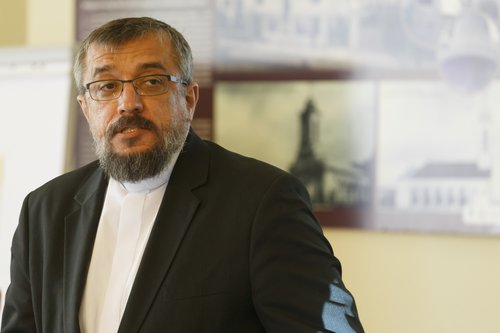
Rev Dr Lászlo Gonda, Associate Professor of Missiology at the Reformed Theological University in Debrecen, invited the participants to self-critical discussion through his theological reflection on statements of churches regarding welcoming refugees. He challenged the participants by sorting out two ways in which many Christians today approach the issue: welcoming refugees in Christ’s name or protecting Christian Europe. Rev Dr Gonda said that those who more favor a Christ-like welcome say that, “Welcoming migrants belongs to the core of our Christian faith. Churches must promote the culture of welcome and take action to offer asylum and assistance to migrants,” whereas those who are of the protective mindset think that, “It is the historical responsibility of our generation to protect Christian Europe from the existential danger caused by mass migration.” He spoke at length about the statement put forth by the Hungarian Reformed Churches as an example of a church that is of both mentalities, fusing these ideas of welcoming refugees in Christ’s name while also working to protect Christian Europe. Rev Dr Gonda then presented basic dilemmas of the two Kingdoms Theory versus the image of the World as “Theater of God’s Glory”; Ethics of ultimate end versus ethics of responsibility; and Politics of guilt and pity versus Mission from the margins, which inspired engaged and honest discussion within the group.
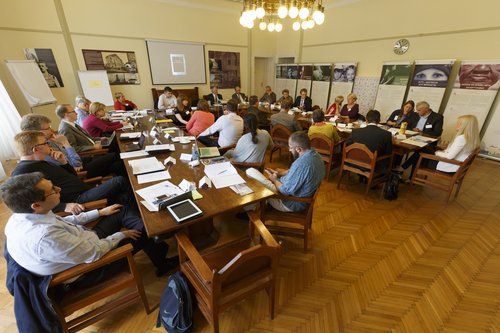
The consultation provided the opportunity to take an in-depth look at recent changes in migration statistics, the evolving legal environment, government social support for migrants, as well as public opinion on migration in the countries that were represented. Around thirty participants from across the EU and beyond were in attendance, representing over a dozen denominations, two faith-based organizations, as well as fourteen different countries. Nations from all over Europe were present at the consultation, including Slovakia, Ukraine, Romania, Poland, Sweden, Italy, Germany, Austria, United Kingdom, Spain, Greece, Netherlands, Czech Republic, and Hungary.
Also in attendance was Doris Peschke, the General Secretary of the Churches’ Commission for Migrants in Europe (CCME), Martina Wasserloos-Strunk, Vice President of the European Council of the World Communion of Reformed Churches (WCRC) in Europe, and Martin Engels, Moderator of the Reformed Alliance in Germany.
Presiding Bishop Dr. István Szabó, of the RCH, was instrumental in bringing about this consultation in Budapest, in conjunction with the strong leadership of Präses Manfred Rekowski, of EKiR, who lead a German delegation to the event. Both church leaders were at the head of large delegations at the consultation, including four representatives from the Hungarian Reformed Church community in the Carpathian basin and four important members of EKiR.
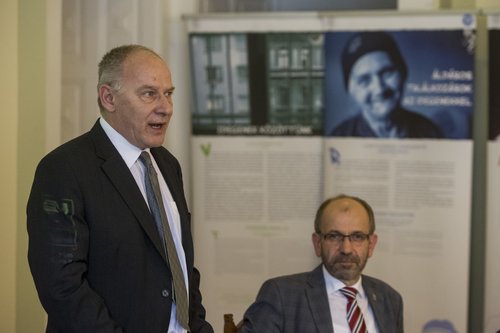
“We want to put together our experiences so we can understand each other and have a theological and biblical grounding for our work,” said Presiding Bishop Dr. István Szabó in his opening remarks to the group.
In his speech that followed, Präses Manfred Rekowski stressed that, “Respect for human rights applies to all human beings without exception; including refugees,” and that, “It is the priority of the church to defend the values and ethical standards characteristic of a responsible Christian refugee policy.” He spoke about the divide in many societies regarding refugee issues and made clear that it is the responsibility of the church to defend the ethical standards and values of vital Christian refugee policy. He continued, saying that, “One-sided solutions serving national interests alone, or shifting problems to other countries, disregard the fates of many needy, persecuted and hungry people and will never be tolerated by our church […] Helping migrants is our common Christian responsibility, our faith-led undertaking.”
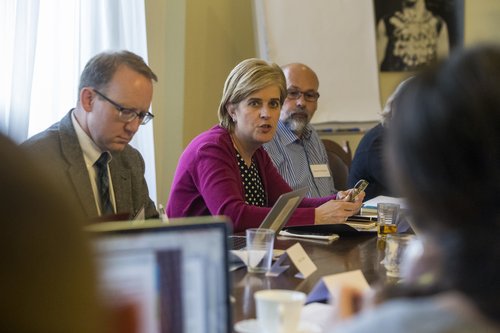
Participants from all over the world talked about the need to find a more unified way to discuss the crisis; for instance, is this crisis a European one or a Global one? Many of those in attendance also stressed that statistics are essential in this line of discussion, but that the way in which they are presented is often done with a slant to increase fear, and so the wider church should work towards a way of communicating that is both honest and clear about the challenges posed by the current situation. Joshua Ralston noted that for a crisis that originates in parts of the world outside of Europe, the response from countries here is very Euro-centric. “The crisis is still primarily about us – how is our society going to respond, how are we going to respond – when our real concern should be for the person that we’re helping,” he said.
The topic of Christian Europe also arose during open discussion and participants had varying viewpoints on what exactly it means and also how important it is to the current dialogue about migration and refugees. Those in attendance were generally in two camps: those who believed in protecting a strong sense of Christian Europe and using that title in order to make the underlying values of their refugee policy known, and those who felt that as the phrase had been corrupted by various politicians it was time to find a new way to talk about these things.
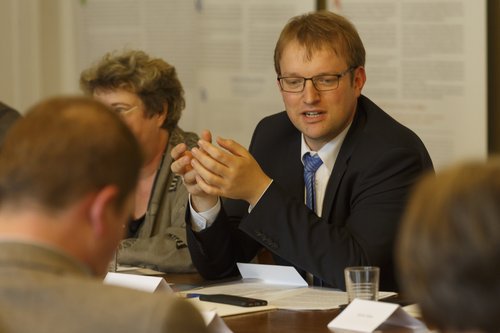
After a full first day of the consultation, those in attendance had the opportunity to join members of the RCH’s Refugee Ministry for dinner and dialogue. Not only were migration and integration experts present, but they also brought along refugees who were willing to speak to the group in smaller settings at their tables about their experiences in Hungary and with the RCH Refugee Ministry. This more informal time for discussion led to a deeper sense of understanding of the situation as a whole –refugees were no longer a statistic in a presentation, but were instead genuine people eager to share their stories of struggle, loss, hope, and joy. The level of personal connection and reflection seen at the dinner continued over into the second day’s prayers, discussions, and theological reflections. During a speech of his, Martin Engels of the Reformed Alliance Germany quoted a statement from the Reformed Alliance, stating that, “The refugees inevitably remind the church of the significance of their foreignness in a world East of Eden.” These sentiments were continued even after the conclusion of the consultation, when interested participants visited the Refuge Ministry of the RCH at the Scottish Mission in Budapest to learn more about the on-the-ground situation in Hungary. Those who attended this additional program heard not only from RCH colleagues there, but also from refugees there who were at the church for various services provided by the Refugee Ministry.
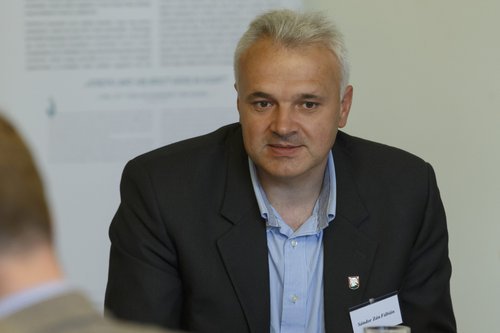
Another important insight to the situation was shared by Sándor Zán Fábián of the Reformed Church in Transcarpathia. Speaking from personal experience with the migration trends in Ukraine, he reminded those in attendance that, “These are human beings, not just a potential workforce. These are not some kind of objects that if we tweak them a little bit they’ll fit our purpose. They are human beings and they have families – if a gap is filled somewhere, what kind of gap is left behind somewhere else?”
These sentiments were also echoed by Presiding Bishop Dr. István Szabó in his comments at the press conference following the consultation. The Bishop reminded journalists about the Ukrainian crisis, in which, “Poland now is the second largest immigration destination in Europe.” Later in the press conference, Martina Wasserloos-Strunk, Vice President of the European Council of the WCRC in Europe, spoke up and said that, “Seeking communion and advocating for issues of social-justice are Reformed specialties.” She went on to talk about how this Reformed essence was part of what made the consultation so worthwhile and productive for those in attendance.
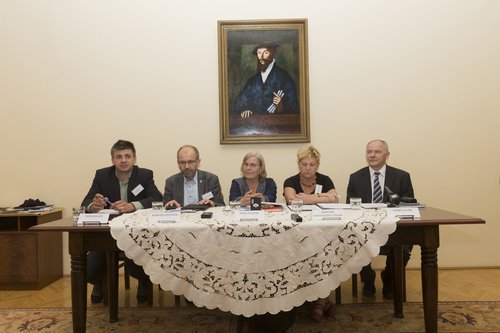
Bouncing off this idea of “Reformed specialties,” Bishop Szabó chimed in that, “We can’t agree with each other on everything, and we don’t always understand each other, but we are children of one faith and we are one family. We have to discuss these issues at one table, like a family.” He spoke about how leaders of European countries should learn from this attitude of the Reformed tradition and, instead of simply enforcing their policies, they should listen to other viewpoints more often. He also went on to stress that we cannot deny the roots of Christian Europe and the values that make it possible to receive refugees. He said that those present should not forget that these values are rooted in Christianity. “If you want to have the fruits of love, solidarity, responsibility, care, and protection – please don’t cut the tree!” said Bishop Szabó.
In addition, the World Communion of Reformed Churches recently established a task force whose job is to focus on migration and asylum, and its members also participated in this important consultation.
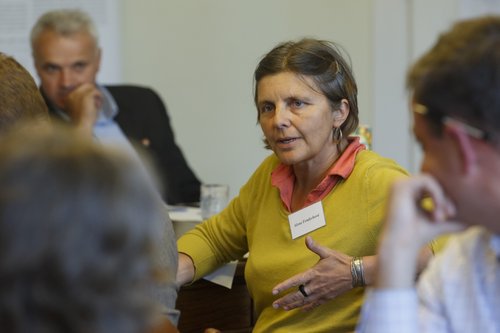
Through this vital dialogue that took place during the consultation, it is our hope that we might come to a common understanding of our collective responsibility in this time of mass migration. The resulting plans for engagement in this vital work were passed along to the WCRC task force as they seek to equip churches to work on the European level, as well as on the national level, as churches that do not remain silent, but instead seek humanitarian solutions together.
In support of Church Leaders of WCRC European member Churches, the task force has committed itself to five major points: participating in a theological reflection on migration and political theology, engaging in a dialogue about the importance of engagement and education on Christian-Muslim relations, partnering with Middle East churches in order to place European responses in a broader context, sharing best practices and new methods of aid from various contexts, and doing all of these things through concrete actions of solidarity and support among the organizations represented. In addition to these steps, members of the WCRC task force will also be making a solidarity visit to partners in Greece in the coming months.
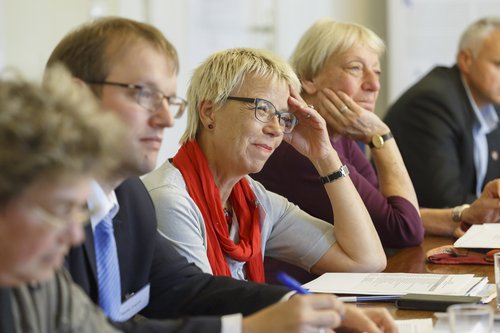
Written by Kearstin Bailey
Photos by reformatus.hu/ Vargosz, Dimény András
Read more about the consultation here